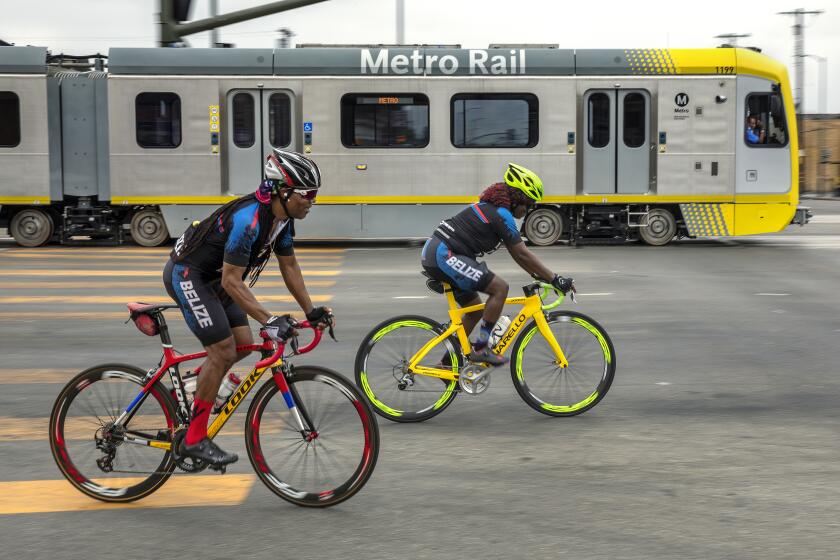Kids run hot/cold on global warming
GLOBAL WARMING is a bit like sex: Long before you think it’s time to explain it to your children, they’ve already heard the mixed-up details on the playground.
I asked my 11-year-old son what he knew. “The water is going to rise about 20 feet, and we’re all doomed,” he said matter of factly, before dashing off to slug his brother.
Two recent national polls, taken in the wake of “An Inconvenient Truth” and mounting news coverage of heat waves and hurricanes, show the majority of Americans now see global warming as a personal threat. And apparently, word has spread to the prepubescent set that they’d better see the San Diego Zoo while it’s still dry.
Apocalyptic fears have shadowed U.S. childhood before this. Who among us boomers doesn’t remember all that Cold War ducking and covering? But global warming is profoundly scarier. For starters, to trigger a nuclear holocaust, somebody has to be the first to bomb. To trigger eco-Armageddon, all we need do is continue to ignore leading scientists’ warnings.
Besides, quite unlike during the Cold War, there’s no evidence that Washington has recognized this crisis. That leaves parents -- hard-wired, unlike politicians, to engage in long-term thinking, calculate risks and buy insurance -- in a bind. Given our government’s glacial response to real-time melting glaciers, how can we help our kids cope?
When it comes to displaying anxiety, adolescents are usually good at jamming parental radar. The essence of juvenile cool is to pretend nothing bothers them, which, combined with shorter attention spans, may be why my son could so deftly juggle species doom and sibling rivalry. And yet as much as kids have faith in their own immortality, experts agree that they’re deeply worried.
After all, our children aren’t dummies. Even if they don’t read the news, they overhear the TV or the anxiety in their parents’ voices, discussing the strangeness of yet another balmy midwinter day. It’s like so many of us who grew up not talking about the drinking dads and depressed moms; what always makes it worse is when adults pretend nothing’s wrong.
And that seems to be our M.O. with global warming. So many of us don’t discuss it with our children, as if we could somehow “protect” them that way. And the subject is all but ignored in U.S. schools, taught, if at all, at teachers’ discretion.
I searched unsuccessfully for a national study that might show how U.S. kids are thinking about global warming, but the question doesn’t seem to be on our pollsters’ radar -- in contrast to Britain, which hasn’t shared our fossil-fuel-lobby-subsidized “debate” about whether global warming is real, or human-caused, or very dangerous. The British, to be sure, live on a large island, the kind of geography certain to feel effects of climate change sooner rather than later. Perhaps that’s why a national YouGov survey showed that British children between the ages of 11 and 14 worry more about climate change (74%) than their homework (64%).
“The grown-ups are handling it far more realistically in Europe than we are here,” said Yale child psychiatrist Kyle Pruett, one of several mental health experts I consulted for advice about how to answer an 11-year-old who says “we’re doomed.” Their advice: Don’t push your agenda on your children. Try first to find out what they know, and whether they’re worried. If so, emphasize the things they can do, even if it’s only finding out more, or switching to fluorescent lightbulbs, or starting a climate-change club at school. “The combination of fear and helplessness is toxic,” Pruett said.
Psychologist Madeline Levine in Kentfield, Calif., didn’t believe U.S. teens were thinking much about climate change -- until she asked several 15-year-olds. “The kids I spoke with are very knowledgeable and incredibly pessimistic. When I asked why they hadn’t brought it up before, they said, yeah, well, it really sucks, but nobody’s going to give up their car, so we’re screwed.” Levine now believes that it’s less important what parents say than what we do. What our kids need to know most is that adults are acting like grown-ups.
So far, we aren’t. But to be a parent is to teach responsibility through sacrifice, to shell out constantly for braces, college savings, roof repairs and on and on. If we want to show our kids we mean business about global warming, let’s start by ponying up for a carbon tax. Let our children watch us demand this from Washington with the courage and force of the civil rights movement.
As a backup, however -- because parents should always have backups -- I’ve been introducing my own children to Buddhist meditation. It has been used for 2,500 years to cope with suffering, anxiety and change -- and may be helpful in the hot decades to come.



